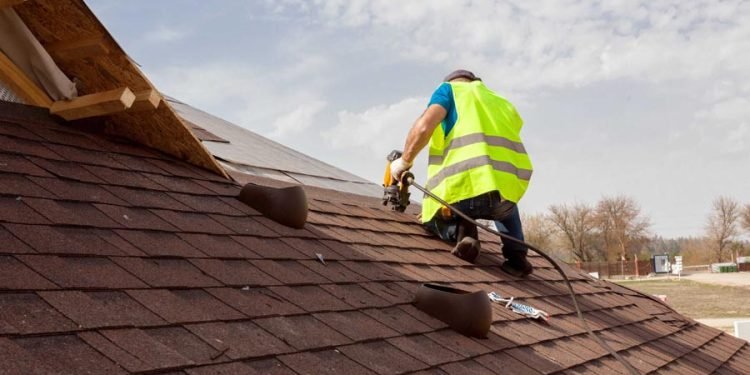The roof on your business or home premises serves many roles to guard you against the sun, rain, wind, dust, precipitation, or any other natural threats. It also maintains the integrity of a general infrastructure and an aesthetic that boosts value.
Because of its significance, your roof needs to be protected from these harsh conditions and anything threatening its worth and function, like fires. But are your asphalt roofing shingles fireproof? Your entire roof can’t be fireproof because even materials that aren’t highly flammable can melt or warp in the heat of a raging fire. Ensure you talk to a professional roofing company for the best deal when shopping for a roof.
Asphalt Shingles Fire Rating Classifications
Most asphalt shingles are in Class A rating and classified as fire resistance. But this is not to say all asphalt shingles are alike.
Here are more details on the classification and ratings to help you select a roofing contractor.
- Class A – The shingles in this Class have the highest fire resistance property, meaning they’re the least explosive. They’re ideal for areas prone to wildfires and the better choice for homeowners.
- Class B – This category can resist an average to a full flame on the surface, spreading up to eight feet. They’re in the same category as pressure-treated shakes and shingles.
- Class C – With less resistance to fire, contractors don’t recommend installing the roof since it only protects against light flames. Untreated wood shakes and shingles are in this Class.
- Unrated – Don’t go for unrated shingles or roofing materials, as they don’t even meet class c classification, which offers the least fire protection.
Fire-Resistant Roofing Materials
When buying shingles for your roof, consider the ratings above for the roof materials below to make it more fire-resistant.
Slate
Slate is made of a stone material that blends beauty, longevity, and natural fire resistance. It weathers slowly or breaks down. Hence, the roof is long-lasting with a few drawbacks; it is heavy and expensive, and installing it requires professional and special equipment for the best result.
Clay Tile
Clay tiles are made of natural, non-combustible materials but are not as heavy as slate. They’re famous for Spanish-style architecture and buildings with a Southwestern theme. To retain the Class A fire-resistant category, it must be installed correctly, as any gaps between the tiles and underlay can permit fire to penetrate.
Concrete Tile
Another excellent roofing material is concrete tile, as they’re reliable and weather resistant, cost-effective, and non-combustible like other roofing materials. Besides, they also come in a wide range of colors, shapes, and finishes suiting anyone’s taste.
Asphalt Shingles
Although asphalt shingles are petroleum-based when backed with fiberglass and a fire-resistant underlay. Asphalt shingles are the most multifaceted kind of roofing material. Combined with fiberglass as an underlay, it becomes a Class A fire resistance classification. Additionally, asphalt shingles are cost-effective roofing options, but the most significant drawback is they need a lot of maintenance.
Metal Roofing
Metal roofing has many good qualities; no corrosion, minor maintenance, long-lasting, and lightweight. They’re also effective at shielding a homestead against rain and snow, help to scatter lightning strikes, and it can also resist hurricane-force winds. Metal roofing can be used on any building with steep to low slopes.
Synthetic Roofing
Synthetic roofing is a composition of sturdy synthetics, shingles, and tiles to imitate the look of wood, natural tiles, and asphalt. As a result, the synthetic roof is highly reflective, which can boost your home’s coolness. Hence, you reduce cooling costs.
Factors to Consider When Choosing a Roof
Your home is a significant investment and hosts the most important people in your life. For this reason, selecting the best roofing system will protect and add value to the investment.
Here are the five factors to consider when buying a roof for your home.
Cost and Budget
Your budget will set the tone for the roof you settle to buy. Determining the roofing materials within your budget narrows down the choices on the table. Be content with what you can afford, and remember expensive only sometimes translates to quality.
Material and Weight
Roofing materials weigh differently; hence it’s a vital factor to consider, as it will be instrumental to the integral structure of your home. Ensure that your home roof structure is sound enough to match the general building and the location.
Weather
The weather of your home’s location is crucial in determining your chosen roof. Some roofing materials are better for specific climates, while others can only work for some reasons, like cold, tropical, or areas prone to wildfires.
Color Diversity
Go for a roofing material that has no limitations but allows you to choose what you want. Besides shielding your loved ones from the sun and harsh weather, the roof is part of the overall aesthetics.
Maintenance
Opt for a roofing material that needs little to no maintenance. Some materials might be beautiful but require a lot of care, while others, like metal, need less upkeep.












